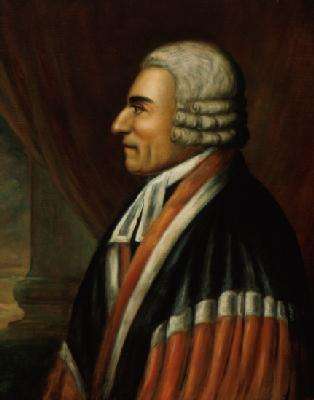The Volokh Conspiracy
Mostly law professors | Sometimes contrarian | Often libertarian | Always independent
Today in Supreme Court History: September 13, 1810
9/13/1810: Justice William Cushing died.

Editor's Note: We invite comments and request that they be civil and on-topic. We do not moderate or assume any responsibility for comments, which are owned by the readers who post them. Comments do not represent the views of Reason.com or Reason Foundation. We reserve the right to delete any comment for any reason at any time. Comments may only be edited within 5 minutes of posting. Report abuses.
Please to post comments


Cushing was the last of the original six members of the Court still in office upon his death in 1810, but was only the fifth to die. Inaugural Chief Justice John Jay, who had resigned from the Court in 1795, did not pass away until 1829. In fact, Jay survived both of his immediate successors as Chief Justice, John Rutledge (d. 1800) and Oliver Ellsworth (d. 1807).
Cushing, as a state court judge, presided over Commonwealth v. Jennison, and declared slavery was unconstitutional under the new Massachusetts constitution:
[T]hese sentiments [that are favorable to the natural rights of mankind] led the framers of our constitution of government - by which the people of this commonwealth have solemnly bound themselves to each other - to declare - that all men are born free and equal; and that every subject is entitled to liberty, and to have it guarded by the laws as well as his life and property.
Cushing was the first associate justice appointed by George Washington and the longest-lasting of his Supreme Court appointments. After the Senate rejected John Rutledge to be Chief Justice, Washington nominated him, and the Senate confirmed. Cushing turned down the position for health reasons.
He served as an associate judge for another 15 years. Cushing's opinion in Calder v. Bull was succinct:
The case appears to me to be clear of all difficulty, taken either way. If the act is a judicial act, it is not touched by the federal Constitution, and if it is a legislative act, it is maintained and justified by the ancient and uniform practice of the State of Connecticut.
He swore in George Washington for his second term. Joseph Story replaced William Cushing on the bench.
Funny how Slavery was only Unconstitutional in those States where it wasn't economically viable anyway.
Why would unconstitutional be capitalized but not economically viable (or viable)? Much like most slaves Francis wasn’t taught how to write English (or is a complete weirdo).
So the good guys won because corporate interests were low?
That is a take on it.
Frank, what facts made you conclude that slavery "wasn't economically viable anyway" in states where it was believed to be unconstitutional? Isn't the truth that the attitude of the sovereign people of such states toward all people was the very reason that slavery wasn't practiced in those states?
There's an alternate universe where Cushing accepted the appointment and John Marshall was never Chief Justice.
According to Charles Warren, Cushing was about the fifth guy Washington tried to nominate to replace Jay. His first choice was Alexander Hamilton. Imagine that alternate universe!
I’m convinced that the Drackman character is a trollbot, along with Riva, Amos, and Pontius. There’s no rational discussion with them. Don’t bother.
Of course there’s no rational discussion with them, you mock them!
So Brian Kilmeade called for killing homeless with mental issues. Where’s the moral outrage?
People are waiting for the Sunday open thread.
HEre: https://www.nationalreview.com/corner/kilmeade-just-kill-mentally-ill-homeless-who-refuse-help/?utm_source=recirc-desktop&utm_medium=homepage&utm_campaign=right-rail&utm_content=corner&utm_term=first
BTW, when did American judges stop wearing wigs?
It is believed that by the time John Marshall became Chief Justice in 1801, Supreme Court justices had standardized their attire to simple black robes and wore no wigs. - AI quickie